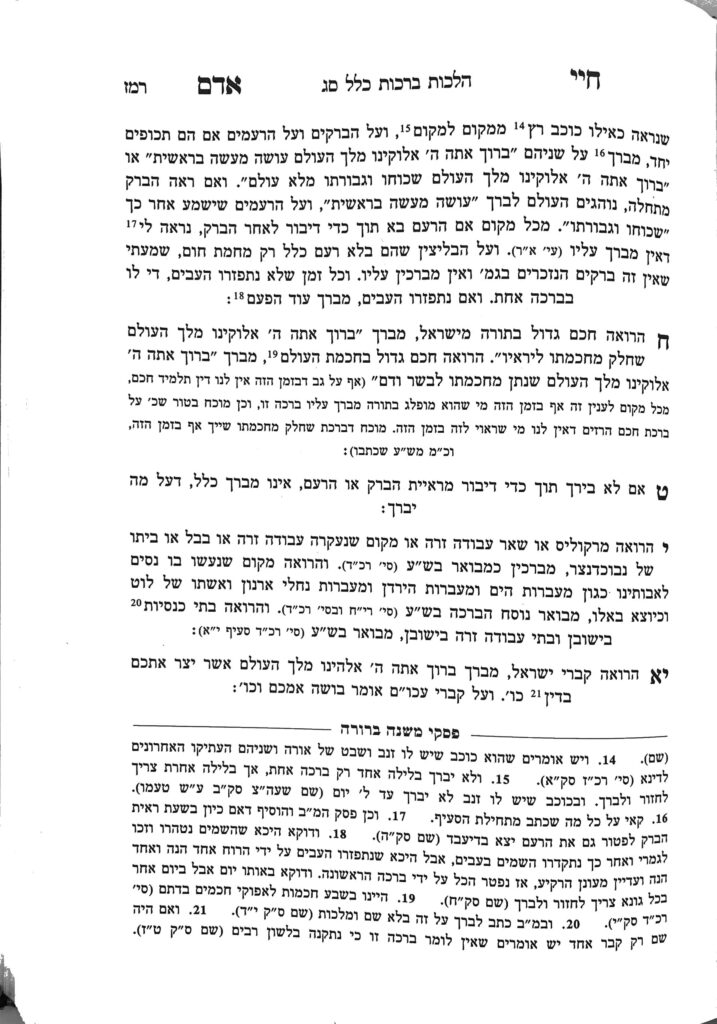We are beginning siman 8. The Chayei Adam writes that if one sees a talmid chacham, they recite the bracha of shecholak mi’chochmaso lireiav. Klal Yisroel are yirei hashem, and Hashem shares His chochma with us. This bracha is specifically recited on one who is a chacham in torah.
If one sees a person who has extraordinary knowledge in chochmas haolam (secular wisdom), they recite the bracha of shecholak mi’chochmaso le’basar va’dam. The Chayei Adam does not specify whether the chacham must be Jewish or not; thus, Rav David Yosef points out that this bracha is made on a Jewish wise person as well.
In the parentheses, the Chayei Adam discusses the definitions of talmid chacham. The Chayei Adam writes that although the Shach, among other poskim, maintain that we no longer have the full status of talmid chacham as it applies to other areas of halacha (e.g., paying taxes), a person who muflag b’chochma, recognized by all as being of extraordinary stature, will receive the bracha.
The Chayei Adam proves this definition from the Tur. We have learned (shiur 1219) that the bracha of chacham horazim is recited on a group of 600,000 Jewish people. The Gemara brings that the bracha is also made on a single Jew who is as important to Klal Yisroel as 600,000 people. The Tur writes that we no longer have people in Klal Yisroel who reach this level. However, when it comes to the bracha of shecholak mi’chochmaso, the Tur does not write anything about this bracha no longer being applicable. Thus, the Chayei Adam concludes that the Tur agrees that the bracha of shecholak michochmaso still applies, even if their level of chochma may not qualify them as talmidei chachamim for other halachos.
Regarding a Jewish individual who is wise in chochmas haolam, although Rav David Yosef indicates from the Chayei Adam that one would make the bracha on them, he also points out that other poskim disagree. Rav Hutner, in Pachad Yitzchak on Chanukah, explains that the reason one would not make this bracha on a Jew is because secular chochmah is not the focus of a Jew. A Jew’s role is to become extraordinary in Torah; extraordinary knowledge in secular wisdom is the role of the goyim. Thus, even if a Jew does become extraordinarily wise in chochmas haolam, the argument can be made that the bracha is not recited on them, because the bracha was not established for them.
The bracha is only made on a non-Jew who has extraordinary wisdom in objective areas of study, such as math or science. A person who is extraordinarily knowledgeable in their religion does not receive a bracha.
Regarding making these brachos through binoculars or glass, we have learned (shiur 1219) that one would not make the bracha. Rav David Yosef brings down multiple sources which permit one to make the bracha. However, it is still not clear what the correct practice should be.
Summary
- The bracha of shecholak mi’chochmaso lireiav is recited on a talmid chacham who everyone agrees is extraordinarily knowledgeable in torah.
- The bracha of shecholak mi’chochmaso le’basar va’dam is recited on a non-Jew who everyone agrees is extraordinarily knowledgeable in objective secular knowledge.
- If one sees the wise person through any medium, they should refrain from making the bracha until they see them in person.



